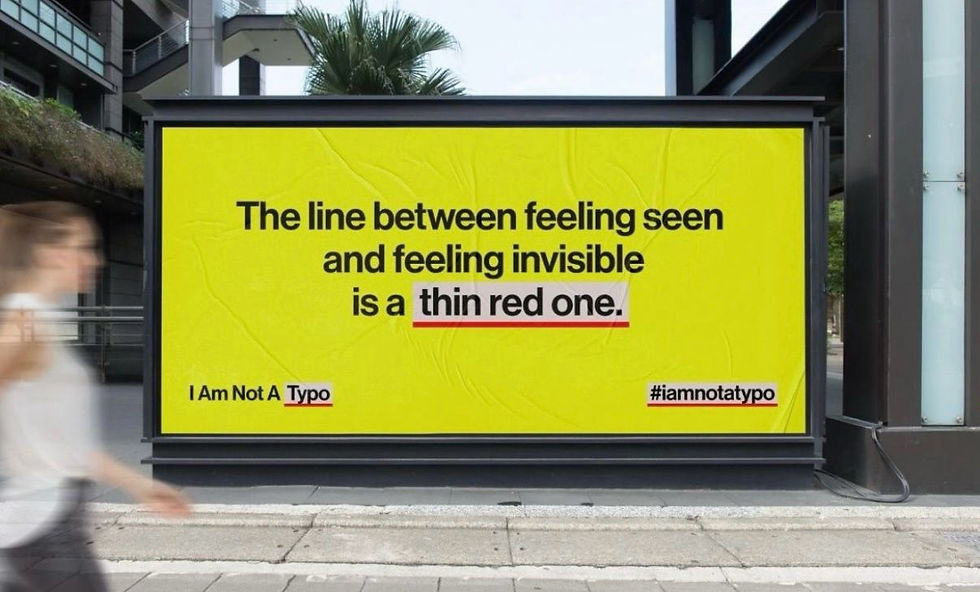Correcting Autocorrect: The Campaign Fighting for Name Inclusion
- BayLeigh Routt

- Mar 10, 2025
- 3 min read
In an increasingly diverse world, subtle forms of exclusion can leave lasting impacts on people’s sense of identity and belonging. One such issue is the persistent failure of autocorrect systems to recognize ethnic names, often flagging them as typos. A new U.K.-based campaign, I Am Not a Typo, aims to address this technological bias and promote inclusivity in digital spaces.
The Problem with Autocorrect Bias
While technology has become more sophisticated, it continues to inherently favor traditional Western names like "Charles" and "Emily" while flagging multicultural names as errors. Journalist Dhruti Shah, one of the campaign’s founding members, often finds her name autocorrected to "Dorito," while academic Rashmi Dyal-Chand frequently sees her name changed to "sashimi." These experiences may seem trivial, but they illustrate a deeper issue: a technological blind spot that subtly reinforces exclusion.
To be fair, autocorrect does seem to learn by repetition. My iPhone now knows my name is BayLeigh Routt—the capital L in the middle is very important—and recognizes various names in my contacts list. Nevertheless, it doesn’t inherently know ethnic names the same way it does more Anglo names such as Charles or Emily. And shouldn’t it? Shouldn’t more ethnic names be recognized more easily by the technology we use every single day.
The campaign highlights that 41% of baby names in Britain are considered typos by Microsoft’s English (U.K.) dictionary, despite the rising popularity of names like Zarah, Matei, and Rafe. Data reveals that in the last five years, 2,328 children in the U.K. were named Esmae, compared to just 36 named Nigel. Even prominent figures are not immune—Prime Minister Rishi Sunak’s surname would likely be flagged as a typo. Despite the multicultural landscape of modern Britain, technology still struggles to keep up.
A Call to Big Tech
The campaign’s goal is to prompt major tech companies—Apple, Google, and Microsoft—to expand their dictionaries to better reflect the diversity of names in modern society. An open letter has been sent to these corporations, though no responses have been received thus far. Fast Company, the world’s leading business media brand, with an editorial focus on innovation in technology, also noted a lack of engagement from the tech giants when they reported on the I Am Not A Typo campaign; they also received no response from tech giants.
Cathal Wogan, senior consulting director at Blurred, a communications consultancy involved in the campaign, acknowledges that autocorrect systems can learn names through repetition. However, the default exclusion of ethnic names remains problematic. Wogan describes this oversight as a "blind spot" rather than outright racism but warns that continued inaction could point to a more deliberate form of ignorance.
Why It Matters
Some may argue that addressing autocorrect bias is a small issue compared to systemic challenges like police brutality or economic inequality. Wogan himself acknowledges that it’s a "lesser evil." However, this campaign underscores the importance of seemingly minor changes that can foster a greater sense of inclusion. Names are integral to identity. When technology fails to recognize or respect those names, it can subtly invalidate an individual’s place in society.
As Britain becomes increasingly multicultural, campaigns like I Am Not a Typo serve as reminders that inclusivity needs to extend into all aspects of life—including digital spaces. Recognizing ethnic names in autocorrect systems may be a small step, but it’s a meaningful one toward creating a world where everyone feels seen and valued.
The campaign hopes to gain traction not only in the U.K. but potentially in the U.S. as well, where similar issues persist. While progress has been slow, efforts like these highlight the power of collective advocacy in pushing for technological change.
Ultimately, as Wogan points out, this isn’t just about correcting typos—it’s about acknowledging the identity and existence of individuals who deserve to be included without barriers, even in the digital world.



































